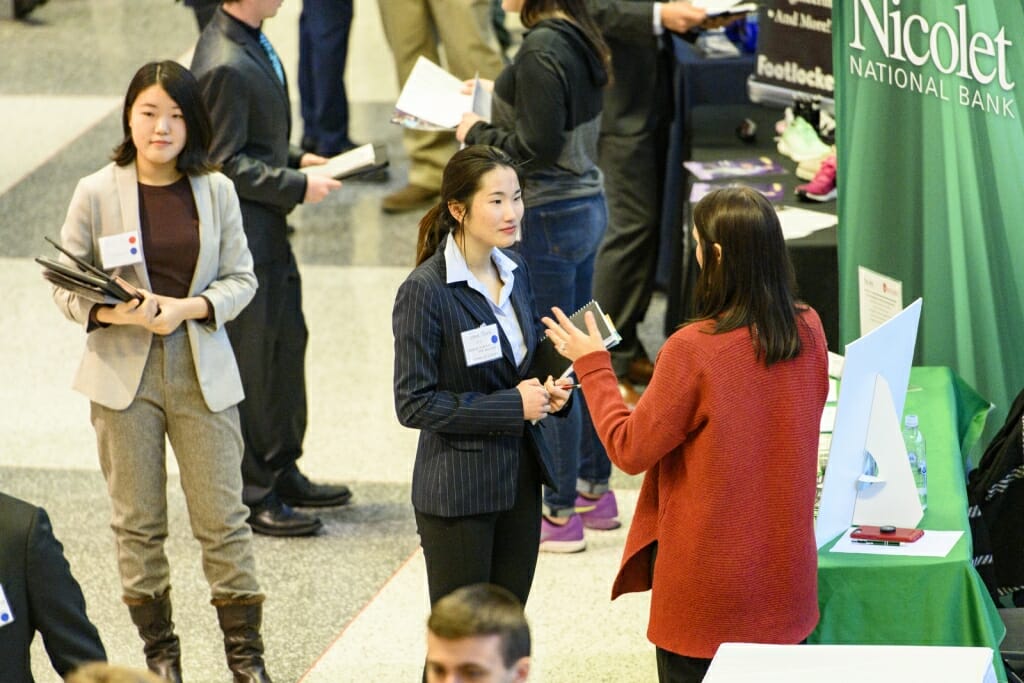Student to student: How COVID-19 has changed our summer plans

UW students talk with recruiters at the Career and Internship Fair in February 2019. Photo: Bryce Richter
Internships are very important additions to your resume. They can help you develop new skills, they can provide professional experience, and they can help you secure your future job.
Unfortunately, the COVID-19 pandemic has led to canceled or downgraded internships for many college students. However, we have discovered that being flexible and creative can lead to new opportunities.
A survey from The National Association of Colleges and Employers found that about 22 percent of employers are revoking their offers to interns, and nearly half of internships were moved into remote programs.
Many UW–Madison students have been affected, including me.
Because I know an internship after my junior year would give me a big boost, I started sending in applications last fall and continuing through winter break. Luckily, a company called to schedule an interview, then two follow-up interviews. In mid-March they offered me an internship for the summer.
I was so excited. The position was in my hometown of Los Angeles, which meant I could be home for the summer.
But then the pandemic struck. In March, in-person classes were suspended. I returned home, and then took a phone call notifying me the internship program was canceled because of COVID-19.
I didn’t know how to respond. I had worked so hard to secure an internship. In a matter of about five minutes, that internship was taken away.
All my hard work was taken away from me.
With no internship, what was I going to do? I went back to the drawing board and applied to a bunch of new positions. I reached out to contacts I had at school to let them know I was available.
And it paid off. A writer I had previously worked with on the 1969 Black Student Strike project referred me to University Communications at UW, where I’m now interning.
UW student Shannon Jones also planned well in advance for his internship. In January he was offered an internship with Canadian Imperial Bank of Commerce in Chicago, to start June 1.
In late April he was told that the current internship program was under review. Chicago has become a hot spot for COVID-19 and the safety of the employees at CIBC is important.
Luckily, the company decided to proceed with internships. “They responded back saying that they were going to honor all the offers extended and try to come up with solutions that would allow us to still be involved in an internship experience,” he said.
CIBC decided to move all its internship dates, and planned to follow the state of Illinois’ COVID-19 guidelines and restrictions.
“I was relieved that they were really trying to make sure we were still involved. Even if it didn’t look like what it was originally going to be, I would still be happy,” Jones said.
Jones was given a new start date of June 15th and was told that he would work remotely, with the option to come into the office when things become safer.
“I feel comfortable will my position being remote. I want to make sure I am being safe and them giving me the choice to come if I want made me feel good that they care about my safety. I’m obviously a little bummed that I won’t be able to interact with everyone in the office like I would have, but it is what it is. I’m lucky to still have an internship this summer when so many people are losing their offers,” said Jones.
This is not an easy time for anyone. Companies are trying to adjust to this new normal and internship programs seem to be taking a big hit. Just as our in-person instruction will be modified, so will many job positions.
One piece of advice that I would like to give is… don’t stop looking. There are still positions that are accepting applications. Branch out and explore options you typically wouldn’t.
UW-Madison has several resources for students seeking internships:
- SuccessWorks for Letters & Science students offers career counseling and resources.
- A new resource guide for colleges, students and employers developed by a UW−Madison education researcher explores how face-to-face internships can be salvaged by redesigning them as online or micro-internships for students and new graduates seeking real-world work experience or a bridge to a permanent job.
- UW-Madison just launched Badger Micro-Internships–short-term paid projects of between 5 and 40 hours per week, many of which can be completed remotely. Offered through the Parker Dewey platform, these opportunities allow students of all majors to develop skills while working on projects from real employers–which means making real connections doing real work.



